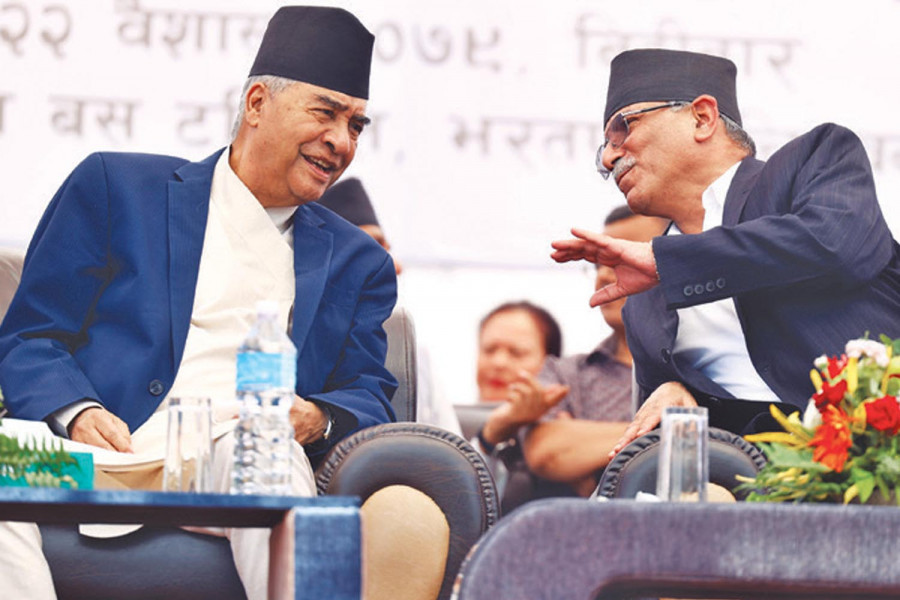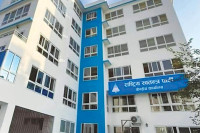Politics
Ruling coalition cracks as Congress locks up presidency
In the meeting, Dahal proposed that the post of the President be given to the Congress, and the rest of the gathering accepted his proposal.
Anil Giri & Tika R Pradhan
Exactly two months after CPN-UML chair KP Oli rescued the prime ministerial ambitions of his CPN (Maoist Centre) counterpart Pushpa Kamal Dahal by ambushing the pre-polls five-party coalition, Nepali Congress appears to have again prised Dahal away from KP Sharma Oli’s embrace.
After an over two-hour-long meeting with Prime Minister Dahal on Friday, Oli had departed Baluwatar bitterly disappointed as the Nepali Congress had by that time already secured the backing of majority parties for its presidential candidate.
After eight political parties, both in and outside the current government, decided to support a Congress candidate in the election for the President, the incumbent ruling alliance stitched together by Dahal and Oli on December 25 has all but broken down.
The UML has decried Dahal’s decision to support the Congress candidate in the election. The UML leaders including Oli have been claiming that while backing Dahal’s bid for prime minister on December 25, it was agreed that the post of President would go to the UML. But when the Congress gave a vote of trust to Dahal on January 10, the new prime minister changed his tone and called for electing the President based on national consensus, something the UML rejected outright.
In order to reach a consensus on the presidential candidate, Prime Minister Dahal had summoned a meeting of the old five-party alliance on Friday evening. Later, three other parties also joined the meeting and promised their support to a Congress candidate. In the meeting, Dahal proposed that the post of the President be given to the Congress, and the rest of the gathering accepted his proposal.
“The meeting the prime minister summoned on Friday evening had a single agenda: whom to give the post of President. We accepted his proposal to give the post to the Congress,” said CPN (Unified Socialist) leader Prakash Jwala.
Now it is up to Nepali Congress to select its presidential candidate. The party has called a meeting of the party’s work execution committee for Saturday to fix the candidate. Senior party leader Ram Chandra Paudel is the most likely candidate, an office-bearer of the Nepali Congress said.
Another senior leader Krishna Prasad Situala is also in the fray, especially given his close relations with Prime Minister Dahal, but Paudel seems to be the favourite.
“Party president Deuba has already given Paudel his word. Paudel helped elect Deuba as party president and he stood by Deuba during the election for the parliamentary party leader as well. Senior party leaders and almost all office bearers are positive on Paudel’s name given his stature,” the Congress office bearer said.
The top leaders of the erstwhile five-party coalition—composed of the Nepali Congress, the CPN (Maoist Centre), the CPN (Unified Socialist), the Loktantrik Samajbadi Party and the Rastriya Janamorcha—were later joined by the chiefs of three more parties— the Janamat Party, the Nagarik Unmukti Party and the Loktantrik Samajbadi Party.
“The prime minister said that a new political journey has begun with our decision,” said Jwala, the CPN (Unified Socialist) leader. “Now, we will join hands to solve the issues of people’s livelihoods.”
Besides giving the presidency to the Nepali Congress, Dahal, Deuba and CPN (Unified Socialist) chair Madhav Kumar Nepal have also “tentatively agreed to become prime minister by turns. Dahal will lead the government for two and a half years, followed by Nepal for one year,” a Nepali Congress leader said. “The Congress will then lead for the last one and a half years and take the party into parliamentary elections.”
The eight-party meeting also agreed to give the post of Vice-president to the Janata Samajbadi Party.
As the election for the President is based on the electoral college, the alliance of eight parties will easily surpass the required vote. Of the 52,628 electoral college votes up for grabs, the eight parties have 31,821 votes.
Before the eight-party meeting, Dahal and Oli had held one-on-one at Baluwatar where Oli vented his ire against Dahal for not keeping his word. Dahal had later briefed the eight-party meeting on his earlier talk with Oli.
Leaders present at the Dahal-Oli meeting said the UML chair had told the prime minister that the existing seven-party ruling alliance would break if the Maoist Centre did not vote for the UML’s presidential candidate and he also signalled that his party would pull out of the government.
According to another senior Congress leader, the eight parties are now discussing power sharing, including for the government at the centre as well as provinces. A task-force will be formed to work out the power-sharing deal, the leader said.
Oli had perhaps already sensed the impending betrayal and thus rebuked the Dahal-led government on Thursday for declaring a public holiday to mark the ‘people’s war’ anniversary, a move he termed as a ‘promotion of violence’. Oli’s remark came after almost two weeks of his silent approval of the holiday decision. Insiders say personal relations between Oli and Dahal started souring since day one of Dahal’s premiership.
“There were multiple instances of discord, but then things really started going downhill between them when Dahal started calling for national consensus on the new President,” a senior UML leader told the Post.
Oli then dipped into his old bag of tricks and on Sunday met CPN (Unified Socialist) chair Madhav Nepal. Oli proposed him to become President, knowing fully well that the Congress would not accept Nepal’s candidacy. He then rushed to Sheetal Niwas to brief the President on the developments. Nepal, according to Unified Socialist insiders, had proposed the revival of the Nepal Communist Party as a precondition for joining hands with Oli.
The eight-party meeting also decided ‘in principle’ to award the Vice-president to the Janata Samajbadi Party.
“There has been an agreement to allocate the President to Congress and Vice-President to our party,” said Upendra Yadav, chairman of the Janata Samajbadi Party. “The Congress will most probably name Ram Chandra Paudel as the presidential candidate.”
Yadav said his party would decide on the name of the Vice-president candidate later. The election of President has been scheduled for March 9.
“The prime minister has appealed to all the eight parties in the new coalition to join the government,” said Rajendra Mahato, a senior leader of Loktantrik Samajbadi Party, a constituent of the new eight-party alliance. “The UML will probably soon pull out of the government.”
The UML has called the meeting of its Secretariat at 9am Saturday, an hour before the nomination for the presidential election starts. Party chair Oli has announced that the party will field its own candidate.
As per the election schedule issued by the Election Commission, the filing of nominations for the presidential election will begin at 10 am Saturday and continue until 3 pm.
The UML has accused the prime minister of a breach of trust, as he supposedly violated the spirit of the December 25 agreement that helped him become prime minister.
“The prime minister has broken the coalition by deciding to support the Congress candidate in the presidential election,” said Predeep Gyawali, deputy general secretary of the UML. “This decision will invite infinite political instability in the country.”
According to Gyawali, people had appreciated the new course the country was taking and the economy had also started to recover. The new turn of events will further increase people’s frustration with democracy, he added.
“This move will only promote a politics of betrayal and crisis,” Gyawali told the Post. “Besides, this decision has weakened the capacity of Nepali political parties to decide on our internal matters.”
He said external power centres had been active in the run-up to the nomination day for the new President.




 14.14°C Kathmandu
14.14°C Kathmandu















